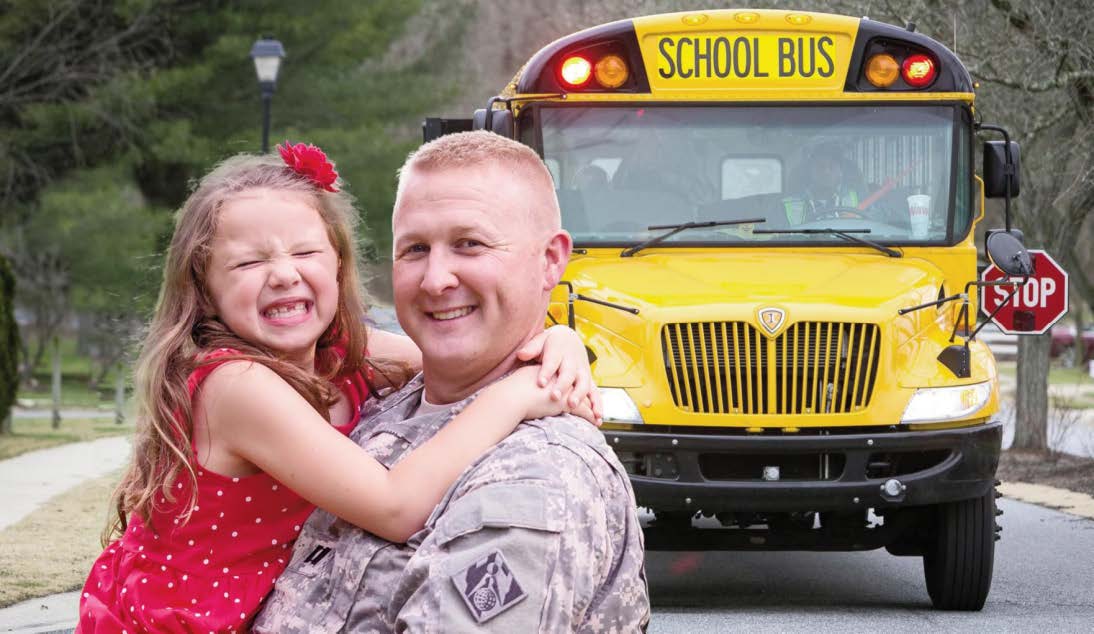
EDUCATIONAL RESOURCES FOR MILITARY-BASED FAMILIES
The unique challenges of the military family must be taken into consideration when creating educational plans necessary to support children and their military families.
Military service members fulfill a wide variety of roles, each requiring individual skills and knowledge with an ultimate responsibility of protecting and serving the individuals within our nation. In addition to their service to country and those who live within the bounds, our service men and women also care for the needs of people in their own family. Those who take on the added responsibility of parenthood face distinctive challenges that are unmatched by their civilian counterparts.
Additionally, children whose parents are active in any branch of the military often are provided a unique educational experience which provides opportunities for growth and development of resilience. However, those same unique experiences common to military families pose stresses due to mobility and deployment. Lengthy and recurring deployments are at the forefront of their dayto-day lives, with the average military child moving six to nine times between kindergarten and high school (DoD, retrieved 2017).
In addition to enduring deployment challenges, children in military families also face the transition challenges of postdeployment period. Moreover, kids in military families sometimes attend school overseas. Relative to the day-to-day household experience, the service member's frequent absences from the family home cause double-duty parenting for the homebased spouse or guardian.
The unique challenges of the military family must be taken into consideration when creating educational plans necessary to support children and their military families. When a child is identified with a learning disability and requires the support of special education through an Individualized Education Plan (IEP), consideration takes on increased importance. Provision of resources to support military families toward a deepened understanding of the unique needs of the learner identified with special needs and providing accessible guidance is our nation's job and duty. This ensures that the children of the military service member are appropriately safeguarded. In truth, safeguarding the children of our military service members is one important way we, as citizens, can demonstrate gratitude, respect and honor for our military families.
In addition to the webliography of resources described in this article, a snapshot of three essential programs available is presented to provide guidance to military families in their dual journey of service to kin and country.

EQUAL FOOTING: The Military Interstate Children's Compact Commission was created to ensure that children of military families are not penalized or delayed in achieving their educational goals.
MILITARY INTERSTATE CHILDREN'S COMPACT COMMISSION (MIC3)
The Military Interstate Children's Compact Commission recently developed and adopted a compact agreement with all 50 states, the District of Columbia and the Department of Defense Education, to ease educational difficulties and transition challenges that children of military families encounter when transferred from schools in different states and localities. The Compact provides for agreements between states in support of issues relative to public schools encountered by children of military families, to include special education services, in order to afford the same opportunities for educational success as other children. It was created to ensure that children of military families are not penalized or delayed in achieving their educational goals. The Compact covers key education issues related to enrollment, placement and attendance, extracurricular activities, and graduation (MIC3 Resources, retrieved 11/27/2017). According to the Guide for Parents and Schools (MIC3 Parents, retrieved 11/28/2017), the Compact, is applicable to public schools only and covers students who are:
• Active duty members of the uniformed services, including members of the National Guard and Reserve on active duty orders (Title 10).
• Members or veterans who are medically discharged or retired for one year.
• Members who die on active duty, for a period of one year after death.
• Uniformed members of the Commissioned Corps of the National Oceanic and Atmospheric Administration (NOAA), and the United States Public Health Services (USPHS).
Of further note within the MIC3 Guide for Parents and Schools (retrieved 11/28/2017), the following may be required during transition:
• Official military orders showing that the military member was assigned to the state (or commuting area) of the state in which the child was enrolled and attended school.
• If a military child was residing with a legal guardian and not the military member during the previous enrollment they will have a copy of the family care plan, or proof guardianship.
• A transcript, official or unofficial, or an official letter from the proper school authority which shows record of attendance, academic information, and grade placement of the student.
• Documented evidence of immunization against communicable disease.
• Evidence of date of birth.
The MIC3 has launched a website designed to better inform the public about the Interstate Compact for Educational Opportunities for Military Children at mic3.net. Through this link, the families of our service men and women are provided valuable resources, news, contact information, links, and recent rulings by the Commission.
EXCEPTIONAL FAMILY MEMBER PROGRAM (EFMP)
The Exceptional Family Member Program is a program that assists in ensuring that service members are assigned to duty stations where their child's special needs can be addressed, especially relative to specialists, such as child psychiatrists and so on, which may not be available in certain duty stations (NMFA, 11/28/2017). According to Military One Source (11/02/2017), the EFMP takes on the task of helping families navigate the medical and educational system, in order to ensure peace of mind about the family member's care. EFMP assignment coordination includes (Military One Source, 11/2/2017):
• Discovery of services available at the present or future duty station. EFMP will ensure that family member's documented needs are considered during relocations. This is a critical aspect of the coordination of assignment process, as appropriate medical and educational services may be limited in overseas and remote locations. Through assignment coordination, the service member is availed the opportunity to focus more clearly upon mission-related responsibilities because of the assurance that the family member's needs are being considered and planned for.
• Support with information, referrals and nonclinical case management to access services.
Through this portion of the program, families are put directly on the path of empowerment by identifying need and connecting access to programs and services available. EFMP will help families understand what is offered, how to determine eligibility, and how to apply for benefits and entitlements. From informing families about available local school and early intervention services to offering opportunities for families with special needs to connect, EFMP can provide "warm handoffs" and bridge the gaps in programs, services and supports.
Each military service branch has EFMP resources to connect with, in order to enroll and discover the array of supports and services available. Military OneSource's Exceptional Family Member Program link is an additional resource to provide outreach and support with regard to the EFMP resource available to military families who have a family member with special medical or educational needs to include (Military OneSource, 11/2/2017):
• Special medical services for a chronic condition such as asthma, attention deficit disorder, diabetes, multiple sclerosis, etc.
• Receives ongoing services from a medical specialist
• Has significant behavior health concerns
• Receives early intervention or special education services through an individual family service plan or individualized education program.
Three avenues of entrance are available, in order to get started on the road toward peace of mind and quality of life that Exceptional Family Member Program will afford on the personal home- front of each military family (MilitaryOne Source, 11/2/2017):
• Visit or call local installation's Military and Family Support Center. You can find your nearest center by linking up to MilitaryINSTALLATIONS, which is the official DoD source for installations and state resources available to active duty, guard, and reserve service and family members.
• Paperwork can be obtained from the EFMP medical point of contact at your local military treatment facility.
• Military OneSource can be contacted via their website at militaryonesource.mil or by phone at 800-342-9647; ask for a referral to a special needs consultant.
RICARE EXTENDED CARE HEALTH OPTION (ECHO)
Tricare Extended Care Health Option provides supplemental services to active duty family members (ADFM) that have qualifying mental or physical disabilities. Through ECHO, integrated services and supplies are provided to ADFM beyond those offered by prime or standard TRICARE programs. A fact sheet is provided by TRICARE at tricare.mil that gives an overview of the ECHO program with regard to eligibility and benefits as summarized below (Tricare, Aug. 2016):
ECHO Eligibility and Benefits are available to TRICARE eligible ADFMs including:
• Those of National Guard and Reserve members called or ordered to active services for more than 30 days.
• Family members who are eligible for continued coverage under the Transitional Assistance Management Program.
under the Transitional Assistance Management Program. • Children or spouses of former service members who were victims of physical or emotional abuse.
• Family members of a deceased active duty sponsor (during the period they are in transitional survivor status).
ECHO coverage may include, but is not limited to the folEach military service branch has EFMP resources to connect with, in order to enroll and discover the array of supports and services available. Military OneSource's Exceptional Family Member Program link is an additional resource to provide outreach and support with regard to the EFMP resource available to military families who have a family member with special medical or educational needs to include (Military OneSource, 11/2/2017): • Special medical services for a chronic condition such as asthma, attention deficit disorder, diabetes, multiple sclerosis, etc. 74 January 2018 • EP Magazine | 2018 EP GUIDE lowing conditions:
• Autism spectrum disorder (ASD)
• Moderate or severe intellectual disability
• Serious physical disability
• Extraordinary physical or psychological conditions of such complexity that the beneficiary is homebound
• Diagnosis of a neuromuscular developmental condition or other condition in an infant or toddler (under age 3) that is expected to precede a diagnosis of moderate or severe intellectual disability or a serious physical disability
• Multiple disabilities which may qualify if there are two or more disabilities affecting separate body systems.
ECHO benefits are provided for the following products and services, with prior authorization from your regional contractor.
"EFMP TAKES ON THE TASK OF HELPING FAMILIES NAVIGATE THE MEDICAL AND EDUCATIONAL SYSTEM, IN ORDER TO ENSURE PEACE OF MIND ABOUT THE FAMILY MEMBER'S CARE."

URNING THE PAGE: The Exceptional Family Member Program takes on the task of helping families navigate the medical and educational system, in order to ensure peace of mind about the family member's care.
• Assistive services (such as those from a qualified interpreter or translator)
• Durable equipment, including adaptation and maintenance equipment
• Expanded in-home medical services through TRICARE ECHO Home Health Care (EHHC), which is limited to U.S., the District of Columbia, Guam, Puerto Rico and the U.S. Virgin Islands
• Rehabilitative services
• Respite care, during any month when at least one other ECHO benefit is received, which is limited to U.S., the District of Columbia, Guam, Puerto Rico and the U.S. Virgin Islands
• Training in use of special education and assistive technology devices
• Institutional care when a residential environment is required
• Transportation to and from institutions or facilities in certain circumstances.
To use ECHO, qualified beneficiaries must be enrolled in the EFMP and be registered for ECHO with case managers in each TRICARE region. An overview of coverage limit and government/sponsor liability, to include cost share amounts, are provided within ECHO fact sheet, along with contact information to include websites and phone numbers. Due to the fact that TRICARE policies and benefits are governed by public law and federal regulations, it is recommended to contact your TRICARE regional contractor or local military hospital or clinic for the most up to date information.
In order to maintain a productive attitude and reduce stress level as permanent change of station (PCS) season approaches, following a few simple tips can help to navigate through the distinctive challenges that military families who have children with special needs face at PCS times.
Here are three key tips for the military family to consider:
1. Keep Records. Updated records are essential and provide a roadmap to your child's education, as they change schools. Keep copies of the most current Individualized Education Program (IEP) or 504 plan and current evaluations in your important documents folder. Additionally, documentation, to include notes or digitalized examples, from teachers with regard to strategies and accommodations that worked well for your child will provide vital information to the receiving educational team. The IEP document is a powerful tool in this process, which is transferable from school-to-school, but requires the authentic and informed perspective of the parent in conjunction with the other team members in order to create a plan that is customized to the child's needs.
2. Get educated. The key to parenting a child with exceptional needs is to gain understanding about the condition and discover ways to support your child in and out of the classroom. Remember to peruse local and state websites to include those within school districts and state departments of education to discover local parent groups, supports, and information with regard to your child's identified disabling condition. The regionally-based Special Education Local Planning Area (SELPA) sites, also provide California links to support groups, procedural information and regulations, and valuable insights and resources with regard to your child's area of need. A SELPA guide is available through the California Department of Education (CDE) at cde.ca.gov. Through deeper understanding of how the child's disability manifests, to include strategies to support such manifestations, parents are afforded the opportunity to lend a proactive and collaborative voice within all IEP team meetings, including the transfer IEP team meet ing at the new school. In moving forward, you are your child's best expert. Therefore, invest time reading about the identified learning disability, discover different parenting tactics, and connect with outreach programs.
3. Reach out to parent and "A FEW SIMPLE TIPS CAN HELP MILITARY support groups. In addition to emotional support and creating opportunities for friendship, parenting groups will teach you to navigate the special education maze, as well as guide you toward learning more about your child's disability. Parenting groups can be geared toward commonalities to include disabilities, dvocacy needs, school reform and special education issues. Being an informed and collaborative IEP team member will FAMILIES WHO HAVE CHILDREN WITH SPECIAL NEEDS NAVIGATE THE DISTINCTIVE CHALLENGES THEY FACE AT PCS TIMES." enhance ease of transition into the new school environment. Through connecting with military resources, discovering organizations that can provide support, and linking to learning about your child's identified learning disability, parents have the opportunity to provide a sense of consistency during an otherwise turbulent transitional period.
WEBLIOGRAPHY: 27 OF THE BEST RESOURCES FOR FAMILIES OF CHILDREN WITH SPECIAL NEEDS
In addition to the service-specific family resources provided within the websites of the six branches of the military to include Air Force, Army, Coast Guard, Marine, National Guard, and Navy, there are additional military specific resources to provide guidance and assistance in your endeavor to support and ease school transitions. Additionally, through the civilian channels, resources for parents of students with learning disabilities are available to connect with in order to support the varying needs of students with a unique learning profile. The following guide is organized with sub-sections to include Military Specific resources and Civilian provided resources.
"A FEW SIMPLE TIPS CAN HELP MILITARY FAMILIES WHO HAVE CHILDREN WITH SPECIAL NEEDS NAVIGATE THE DISTINCTIVE CHALLENGES THEY FACE AT PCS TIMES."
MILITARY SPECIFIC GENERAL FAMILY RESOURCES
acttodayformilitaryfamilies.org is a national non-profit organization sponsored by ACT Today! (Autism Care and Treatment Today!). Raising awareness and provision of financial assistance to help defray out-of-pocket costs for families who cannot afford the autism treatments and other quality of life services their children require is the mission of ACT. A list of resources is provided within the website, as well as a blog to support military families who have children on the autism spectrum.
facebook.com/militaryautism is an award-winning Facebook page in support of military families, by military families. The page was founded in 2008. The mission is to provide news, information, community and support to military families dealing with autism spectrum disorder.
mic3.net is the site of the Military Interstate Children's Compact Commission (MIC3). The mission included in the website states, "Through the Interstate Compact, MIC3 addresses key educational transition issues encountered by children of military families." The vision expressed is, "Successful Educational Transitions." The values represented by the MIC3 website include:
• Doing the right thing for children
• Resolving issues fairly
• Respect for all
• Transparency in all we do
• Committed to making a difference
In addition to newsletters and articles highlighting the compact, under the News & Media tab, parents can find information relative to their state and a Guide for Parents and Schools, under the Parent tab. Also under the Parent tab is a convenient and helpful parent flow chart to support contact with School Liaison Officers (SLO), MIC3 State Commissioner, and MIC3 National Office. Under the Resources tab, State Statutes, Compact rules including a section on special education services, useful links, and publications.
militaryfamily.org This site is provided by the National Military Family Association (NMFA). According to the mission statement within this link, the NMFA is the "go to" source for Administration Officials, Members of Congress, and key decision makers when they want to understand the issues facing military families. They are reported to have "boots on the ground" with military families and understand better than anyone that "military families serve, too." In addition to a varying amount of military family specific topics, the tab Info + Resources provides a nice overview of Exceptional Family Member Program (EFMP), which serves the essential function of coordinating the assignment process to ensure special needs families are sent to locations that provide access to adequate medical or educational resources. Of further note is the link Kids + Operation Purple that provides an overview and link of the Interstate Compact on Educational Opportunity for Military Children. This is an agreement among states to provide uniform treatment for military children moving to new school districts, to include those with special education services.

UPLIFTED: The Military Child Education Coalition's mission is to ensure inclusive, quality educational opportunities for all military and veteran-connected children affected by mobility, transition, and family separation.
militaryspouse.com is a digital magazine which proclaims within their masthead, "Simplifying your crazy, wonderful military life." Under the Relationships tab, links pertaining to parenting and family articles are available to include articles containing information about special education and military children. Additionally, there are links to military resources to support and guide families with children who have special needs.
militaryonesource.mil The mission of this military specific resource is to connect you to your best MilLife. Within the comprehensive site, the military family has access to an array of topics. Especially relevant to parents who are raising children with special needs is the category of Family & Relationships, which includes topics of Special Needs and Parenting & Children. If you are looking for a great source with a background of common experiences within the unique scope of the military family, connect with Military One at the link provided above.
operationautismonline.org is noted to be a web-based resource specifically designed and created to support U.S. military families touched by autism and autism spectrum disorders (ASD). It is sponsored and maintained by Organization for Autism Research (OAR) and funding support of the American Legion Child Welfare Foundation. The introduction within the home page reports that it serves as an introduction to autism, a guide for the life journey with autism, and a ready reference for available resources, services, and supports. The shared intent includes:
• Provide military families touched by autism with access to quality, evidence-based information about ASD.
• Identify sources of treatment and support on and off base
• Offer tips for dealing with some of the unique challenges military life poses for military dependent children with autism and their families.
• Inform parents about their child's educational rights and offer some practical strategies for success in the classroom.
The OARacle, a free monthly electronic newsletter that provides discussion of research findings, resources, news from around the autism community, and perspectives from parents, professionals, and educators is available to browse or to subscribe.
militarychild.org The Military Child Education Coalition shares their mission: "To ensure inclusive, quality educational opportunities for all military and veteran-connected children affected by mobility, transition, and family separation." Military families can access Parents & Students tab, and be provided an array of choices to electronic booklets, via the Military Child Education Coalition, within the resources or library links to include choices as:
• The USAA Educational Foundation Children with Special Needs
• A Military Parent's Guide to School Policies & TransitionsPolicies & Transitions
• K-12 Core Curriculum Standards Why are they the same, only different?
Also, within Military Child Education Coalition is a link to the Military Child Education Coalition store where families can shop online for a multitude of products to support them in their endeavor to provide quality education programs. Topics range from military culture resources to exceptional needs. The link will take you to a new window: store.militarychild.org. Under the Exceptional Needs tab within the Military Child Education Coalition Store you will find books to order to include:
• Special Needs Families in the Military: A Resource Guide by Janelle Hill and Don Philpott is a book written to guide and advise military families with children who have special needs. Per the foreword, the book "is not intended to be a guide for any specific special need, but an overall 'compass' of sorts to help families familiarize themselves with their options." Chapters include:
• First Steps
• Diagnoses
• Caregiving and Support
• Education
• Medical Care
• Insurance
• Funding Support and Legal Issues
• Advocacy
• Coping
• Resources
tricare.mil This is the official website of the Defense Health Agency (DHA) a component of the Military Health System. In addition to providing an overview of TRICARE plans, costs, and benefits, you can find information about Special Needs under the See What's Covered tab. Fact sheets with regard to Autism, Mental Health, and Extended Care Health Option (ECHO) are available within the Special Needs link.
wapave.org Partnership for Action, Voices for Empowerment provides partnership for military parents of children or young adults with a disability or special health care need. In addition to various links to resources, articles, and newsletters, Programs of PAVE are introduced to include Specialized Training of Military Parents (STOMP), which provides in-person workshops and one-hour webinars throughout the US and overseas for military families and military personnel. Check out the information in the IEP section on this site.
zerotothree.org/our-work/military-family-projects Zero to Three supports military families in an endeavor to increase awareness and collaboration throughout the military community in support of parents and professionals to increase effectiveness in the care of very young children and their families. Within the website, families and professionals have access to an array of information to include a series to build the resilience of young children and their families through the specialized lens of the military family. In addition to developmental topics of ages and stages, Zero to Three provides topics relative to Early Intervention, which is a provision of the federal legislation of the Individuals with Disabilities Education Act (IDEA), under "Child Find" (U.S. Dept. of Education, 2011). The "Over There" Activity Book available within the website provides a helpful support for children on the autism spectrum who experience difficulty with theory of mind and social understanding.
"CHADD WAS FOUNDED IN 1987 IN RESPONSE TO THE FRUSTRATION AND SENSE OF ISOLATION EXPERIENCED BY PARENTS AND THEIR CHILDREN WITH ADHD.
NON-MILITARY ORGANIZATIONS AND INFORMATION IN SUPPORT OF STUDENTS WITH SPECIAL NEEDS
ATTENTION DEFICIT: chadd.org is sponsored by Children and Adults with Attention-Deficit/Hyperactivity Disorder (CHADD), which was founded in 1987 in response to the frustration and sense of isolation experienced by parents and their children with ADHD. Provided within the website are links, tips and resources, and an opportunity to subscribe to a free newsletter. In addition to free resources provided within the website, various paid membership is available. CHADD has three current priority objectives to including serving as:
1. A clearinghouse for evidence-based information on ADHD.
2. A local face-to-face family support group for families and individuals affected by ADHD.
3. An advocate for appropriate public policies and public recognition in response to needs faced by families and individuals with ADHD.
AUTISM: autisminternetmodules.org The Autism Internet Modules (AIM) is one of the many online resources available to family members, educators, or any individual who works with or lives with someone with autism. AIM provides no-cost instructional modules to include evidence-based practices for home, school, community, and work place. Modules are simple to navigate and make it easy for the busy parent to learn at their own pace. This site features tools to ensure that families and service provers are equipped to effectively care for, support, educate, employ, or work with individuals on the autism spectrum from early childhood to young adulthood. AIM's watchwords are "Linking research to real life."
CEREBRAL PALSY: cpdailyliving.com/about CP Daily Living was inspired by one family's struggle to find resources information about the day-to-day details involved in raising a child with cerebral palsy. The goal of this site is to help make the journey easier by helping parents and caregivers navigate the challenges of CP through sharing of information and experiences about a range of topics to include treatment modalities, negotiation of air travel, emotional perspectives, education/preschool, sleeping, eating, and growing up. Tabs include:
• What is Cerebral Palsy
• What is Cerebral Palsy • Newly Diagnosed
• CP News & Books
• Daily Living
• Adaptive Needs
• Support & Planning
• Associated Disorders/Difficulties
• Supporting the CP Community & More
• Inspiration
• Patient-Professional Communications
Within a sidebar of Contents under the Support & Planning tab, also available is a link providing Parent to Parent Organizations, listed by state.
DEAF/HARD OF HEARING: csun.edu/deafproject/index.html The Deaf Education and Families project consists of faculty and staff associated with the Family Focus Resource Center at California State University Northridge (CSUN), in addition to faculty in the Deaf Education Program in the Department of Special Education. Resources to support the family, as well as a newsletter is available. Within the family project at CSUN, the goal is to empower parents of children who are deaf to get educated, get together, and communicate. One unique resource available for parents, within this site is the lending library. It is noted that the Lending Library is for families with deaf or hard of hearing chil dren. Families may borrow any items for a specified period of time. The contact for Lending Library is deafproject@sun.edu or 818-677-6854.

STRATEGIES IN ACTION: autisminternetmodules.org features tools to ensure that families are equipped to effectively care for, support, educate, employ, or work with individuals on the autism spectrum from early childhood to young adulthood.
handsandvoices.org is a parent-driven, non-profit organization in support of families of children who are deaf or hard of hearing. Membership includes families who community manually and/or orally. All approaches and experiences with deafness or hearing loss are included, from American Sign Language to cochlear implants. Local chapters comprised mainly of parents along with professionals are available and can be contacted via the website. Additionally, resources such as links and handbooks are available within this site. Topics ranging from education, the law, perspectives from families and individuals who are deaf or hard of hearing, and much more is available on the website.
DOWN SYNDROME: ardsac.org/index.html According to the Mission & Vision statement provided by The Down Syndrome Advancement Coalition (DSAC) of Arkansas, they are a partnership of active Down syndrome organizations across the state of Arkansas, advocating on the behalf of individuals with Down syndrome and their families. Brittany Boccher, an Air Force spouse, founded the DSAC in 2016. Under the tab identified as Resources are local links and events within Arkansas. Additionally, national links are provided within the resource tab.
ndss.org is the home of the National Down Syndrome Society (NDSS). Under the mission statement of the NDSS site, it is noted that they are the leading human rights organization for all individuals with Down syndrome. The NDSS is a nonprofit organization and is committed to their vision of "…a world in which all people with Down syndrome have the opportunity to enhance their quality of life, realize their life aspirations and become valued members of welcoming communities." There are a number of programs and resources available within the website, to provide across-the-lifespan guidance, support and information. Additionally, there local support groups, social media, and newsletter links to support families.
DYSLEXIA: dyslexiaida.org A resource guide for parents of children with learning disabilities is just not complete without information from The International Dyslexia Association (IDA). This is the oldest organization dedicated to the study and treatment of dyslexia. IDA is rooted to Dr. Samuel T. Orton's pioneering studies, in the 1920s, relative to the field of reading research and multisensory teaching. Formalized organization of the Orton Society began after Dr. Orton's death, through his wife and colleague June Orton, in 1949. Orton's important pioneering work would continue through teacher training and published instructional materials. The Orton Society would eventu ally become International today's Dyslexia Association that abides by their mission: To create a future for all individuals who struggle with dyslexia and other related reading differences so that they may have richer, more robust lives and access to the tools and resources they need. Families and professionals are provided access to handbooks, fact sheets, conferences, and workshops. Under the Families tab, discover the helpful IDA Dyslexia "THE CHILD MIND INSTITUTE IS DEDICATED TO TRANSFORMING THE LIVES OF CHILDREN AND FAMILIES STRUGGLING WITH MENTAL HEALTH AND LEARNING DISORDERS. " Handbook: What Every Family Should Know. Numerous fact sheets and resources are pro vided within this website. Additionally, check out the Youth Art Gallery under the Families tab to learn how IDA highlights the artistic talents of students with dyslexia and other related learning disabilities during Annual Conferences and throughout the year at their home offices and within various IDA publications.
dyslexia.yale.edu The Yale Center for Dyslexia and Creativity (YCDC) provides a comprehensive wealth of information for parents and educators. YCDC was founded by worldrenowned physician-scientist and leaders in the field of dyslexia research and diagnosis, Drs. Sally and Bennett Shaywitz. It provides avenues to support understanding of dyslexia for the parent, teacher, and child. The mission of YCDC is to increase awareness of dyslexia and its true nature, specifically to illuminate the creative and intellectual strengths of those with dyslexia, as well as disseminate the latest scientific research and practical resources. Transformation of the treatment of all dyslexic children and adults is of critical importance, based upon the mission provided. If you are interested in deeply learning about dyslexia, this website will provide you an abundance of information and even provides a free newsletter.
"THE CHILD MIND INSTITUTE IS DEDICATED TO TRANSFORMING THE LIVES OF CHILDREN AND FAMILIES STRUGGLING WITH MENTAL HEALTH AND LEARNING DISORDERS. "
mation and even provides a free newsletter. LEARNING DISABILITIES: ldonline.org LD OnLine is noted to be an educator's guide to learning disabilities and ADHD, but lends a comprehensive hand to support parents, as well. The site features LD Basics and ADHD Basics, LD Topics, Home-to-School Connection, Resources, and more. LD OnLine describes their organization as one that seeks to help children and adults reach their full potential by providing accurate and up-to-date information and advice. LD OnLine, a national educational service of WETA-TV (the PBS station in Washington, D.C.), also offers comprehensive educational sites to include ReadingRockets, Start with a Book, ColorinColorado and AdLit.org. Opportunity to subscribe to a free newsletter is available.
MENTAL HEALTH AND LEARNING DISORDERS: childmind.org The Child Mind Institute is an independent, national nonprofit organization. They provide three commitments, relative to creating a brighter future for children to include: (1) Best, most effective treatments when and where needed most. (2) Advancement of the science of the developing brain to improve diagnosis and treatment. (3) Provision of useful, accurate information that empowers families and communities to get the help they need. Child Mind Institute reports that they are dedicated to transforming the lives of children and families struggling with mental health and learning disorders. They note that resources are provided freely and funding from the pharmaceutical industry is not accepted. Take a peek under the Topics from A-Z to discover what is available to families relative to issues ranging from ADHD, anxiety, learning, medication and more. Guides are available for families to include a range of subjects within this section. The For Families tab includes insights and advice regarding common concerns that families face to include an array of subjects from parenting guides containing information about selective mutism and ADHD medications, as well as a special section relative to the unique challenges that military families face to include a broad collection of articles, strategies, and expert advice on how to know when children are not responding in a healthy way to stressors in the family and much more.
PARENTING GROUPS AND RESOURCE GUIDES: snrproject.com Special Needs Resource Project (SNRP) focus is to help you learn the basic skills needed to obtain the specific resource information, equipment, and services your child and family needs. The site is designed to assist parents of children ages 0 to 22 to get a jumpstart in the search for information and resources to support their children with chronic health issues, disabilities and special needs. The site includes a military section, resource links, newsletters, and much more.
understood.org This website is for families who are parenting children with learning and attention issues. The website was founded by 15 non-profit organizations, under the operation and management of the National Center for Learning Disabilities. This site provides for a broad perspective, which one single organization may not be capable of providing on its own. The sponsoring organizations include:
• Benetech
• Center for Applied Special Technology (CAST)
• Children's Health Counsel (CHC)
• Child Mind Institute
• Common Sense Media
• Emily Hall Tremaine Foundation
• Eye to Eye
• GreatSchools
• Learning Disabilities Association of America (LDA)
• National Center Disabilities (NCLD) for Learning
• New Profit
• Oak Foundation
• Poses Family Foundation (PFF)
• Reading Rockets
• Peter and Elizabeth C. Tower Foundation
The goal of Understood is to help the millions of parents whose children, ages 3-20, are struggling with learning an attention issues. They strive to empower parents to understand their children's issues and relate to their experiences. With this knowledge, Understood looks toward providing parents the tools "to make effective choices that propel their children from simply coping to truly thriving."
Navigation tabs to support parent exploration, provide for a multitude of topics ranging from home to school to community across social/emotional, school partnership, eligibility, events/outings, groups, etc. The tab includes:
• Learning & Attention Issues
• School & Learning
• Friends & Feelings
• You & Your Family
• Community & Events
• Your Parent Toolkit
The comprehensiveness of this website is astounding and provides for opportunities to connect as tightly as you feel comfortable. In Understood's endeavor to provide parents with a path to support them toward feeling increased confidence and capability and lessen the frustration and aloneness, the professionals who advise parents are experts in their fields and include educators, learning and attention specialists, physicians, psychologists, lawyers and more.

PICK OF THE PATCH: Active duty Coast Guard, Petty Officer Jenkins, looks like an everyday civilian dad as he shoulders the dual responsibility to include service to country and those who live within the bounds, in addition to caring for the needs of people in his own family. Jenkins' wife Reanna and son Eric savor the moments when they can laugh and participate in the joys of everyday life as a family unit.
yellowpagesforkids.com is where you will find a comprehensive list of resources available across the nation, to include U.S. Territories and the District of Columbia. The Yellow Pages for Kids provides a list of disability organizations and information groups. Parent information groups are provided by state. Additionally, state departments of education and regulations are provided to include U.S. Territories and the District of Columbia. This easy-tonavigate site offers a comprehensive array of resources across a wide range of localities that fits nicely with the mobile life of the military family.
SPEECH / LANGUAGE IMPAIRMENT:
superduperinc.com is the website of Super Duper Publications, a company that sells speech/language materials and curriculum. Although the site is retail in nature, it also provides a FREE Stuff tab that contains free online, informational newsletters for teachers and parents. Due to the unique and wide-ranging needs of students with communication disorders, which inhibit so many aspects of living life, this recommended site will provide a perspective to parents that is often not readily available to those outside of the very specialized field of the speech/language pathologist. Free flyers for parents and teachers include an array of topics:
• Fun ways to practice articulation in the car
• Identifying signs of disorders in language, speech sound, stuttering, voice quality, and hearing.
• Special education disability categories.
• Understanding dyslexia
VISUAL IMPAIRMENT, INCLUDING BLINDNESS:
pathstoliteracy.org This resource is the result of a joint project between Perkins School for the Blind and Texas School for the Blind and Visually Impaired (TSBVI), which combines resources and expertise to support educators and families in their quest to provide literacy experiences for children who are blind or visually impaired. Helpful and informative links within this website are blogs, strategies, and events including webinars. A Path to Literacy Newsletter is available. Readers can browse by topic to discover areas of need to include:
• Auditory Strategies
• Braille
• Cortical Visual Impairment (CVI)
• Deafblind
• Dual Media
• Emergent Literacy
• English Language Learners
• General Literacy
• Learning Media Assessment
• Math Literacy
• Multiple Disabilities
ABOUT THE AUTHOR: Angela Shaw is a special educator who synthesizes her diverse education and experience to collaborate with families and staff, in order to promote success and encourage the students in her care to be life-long learners. Her publishing focus is upon special education topics. Shaw's son-in-law is an active duty U.S. Coast Guard. Shaw and her husband spend much of their free time adventuring to various PCS locations and enjoying every possible minute with their sonin-law, daughter, and baby grandson.
